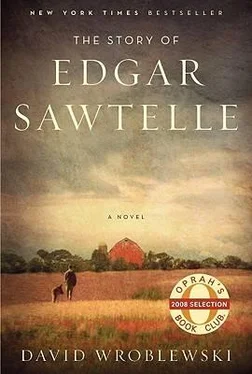“Pretty good sized, aren’t you?”
It wasn’t exactly what Edgar expected him to say. Before he could reply, Claude’s gaze shifted again, this time to Almondine, who stood swinging her tail in anticipation.
“And this is?”
“Almondine.”
Claude knelt, and it was clear at once that he had been around dogs a long time. Instead of petting Almondine or scratching her ruff, he held out his hand, knuckle first, for her to sniff. Then he puckered his lips and whistled a quietly hummed tweedle, high and low at the same time. Almondine sat up straight and cocked her head left and right. Then she stepped forward and scented Claude thoroughly. When Edgar looked up, his father had a look of shocked recollection on his face.
“Hey, girl,” Claude said. “What a beauty.” Only after Almondine had finished taking his scent did Claude touch her. He stroked her withers and scratched her on the chest behind her elbow and ran his hand along her belly. She closed up her mouth and arched her back in a gesture of tolerant satisfaction.
“Man, it’s been-” Claude seemed at a loss for words. He kept stroking Almondine’s coat. He swallowed and took a breath and stood up. “I’d forgotten what they’re like,” he said. “It’s been a long time since I could just run my hand over a dog like that.”
There was an awkward silence and then Edgar’s father led Claude up to the revitalized spare room. They’d waited dinner and Edgar set the table while his mother pulled ham out of the refrigerator and cut up leftover potatoes to fry. They worked in silence, listening to the talk. As though to make up for his earlier comment, Claude pointed out differences, large and small, between the way things looked and the way he remembered them. When they came downstairs, the two men stood in the wide passageway between the kitchen and the living room.
“How about dinner?” his mother asked.
“That’d be fine,” Claude said. He looked pale, suddenly, like someone troubled by something he’d seen, or some memory newly dredged up, and not a happy one. No one spoke for a time. Edgar’s mother glanced over at them.
“Just a second,” she said. “Hold it. You two stay there. Edgar, go stand by your father. Go. Go!”
He walked to the doorway. She stepped away from the frying pan and let the potatoes sizzle and put her hands on her hips and squinted as if eyeing a litter of pups to pick out the troublemaker.
“Good God, Sawtelle men look alike,” she said, shaking her head. “You three were stamped out of the same mold.”
Evidently, she saw three self-conscious smiles in return, for she burst out laughing, and for the first time since Claude arrived, things began to feel relaxed.
By the time the meal was finished, Claude’s haunted look had softened. Twice, he stepped onto the porch and lit a cigarette and blew smoke through the screen. Edgar sat at the table and listened to the talk until late in the night: about the kennel, the house, even stories about Edgar himself. He taught Claude a couple of signs, which Claude promptly forgot. Almondine began to lean against the newcomer when he scratched her, and Edgar was glad to see it. He knew how much the gesture relaxed people. He sat and listened for a long time until his mother pressed her hand on his forehead and told him that he was asleep.
Vague recollection of stumbling upstairs. In his dreams that night he’d stayed at the table. Claude spoke in a voice low and quiet, his face divided by a rippling line of cigarette smoke, his words a senseless jumble. But when Edgar looked down, he found himself standing in a whelping pen surrounded by a dozen pups, wrestling and chewing one another; and then, just as he lapsed into deep, blank sleep, they stood by the creek and one by one the pups waded into the shallow water and were swept away.
EDGAR OPENED HIS EYES in the dark. Almondine stood silhouetted near the window, drawing the deep breaths that meant she was fixated on something fascinating or alarming. He clambered out of bed and knelt beside her and crossed his forearms on the windowsill. Almondine swept her tail and nosed him and turned back to the view.
At first he saw nothing out of the ordinary. The maple tree stood freshly leafed out just beyond the porch, its foliage black under the yellow glow of the yard light high in the orchard. No commotion had erupted in the kennel; the dogs weren’t barking in their runs. The shadow of the house blanketed the garden. He half expected to see a deer there, poaching seedlings-a common trespass in summer, and one Almondine regularly woke him for. Not until Claude moved did Edgar realize his uncle had been leaning against the trunk of the maple. He wore jeans and a flannel shirt that belonged to Edgar’s father and in his hand a bottle glittered. He lifted it to his mouth and swallowed. The way he held it in front of him afterward suggested contents both precious and rare.
Then Claude walked to the double doors fronting the barn. A heavy metal bar was tipped against them, their custom whenever a storm might come through. Claude stood considering this arrangement. Instead of opening the doors, he rounded the silo and disappeared. From the back runs a volley of barks rose then quieted. A few moments later Claude appeared at the south end of the barn, hunkered down beside the farthest run. His tweedling whistle floated through the night. One of the mothers pressed through a canvas flap and trotted forward. Claude scratched her neck through the wire. He moved down the line of runs until he had visited every dog and then he returned to the front and set the brace bar aside and opened the door. Had he walked in directly, a stranger, the dogs would have made a ruckus, but now when the kennel lights came on there were a few querulous woofs and then silence. The door swung shut, and Edgar and Almondine were left watching a yard devoid of all but shadow.
The small workroom window began to glow. A moment later Patsy Cline’s voice echoed from inside. After a few bars, the melody warbled and stopped. Roger Miller launched into “King of the Road.” He had just begun to describe what two hours of pushing broom bought when he, too, was cut off. There followed a swell of orchestral music. Then some big band number. The progression continued, each song playing just long enough to get rolling before it was silenced. Then the music stopped.
Almondine huffed at the quiet.
Edgar pulled on his jeans and picked up his tennis shoes. The lamp in the spare room cast a dim glow into the hall and he swung the door back and looked inside. The line-dried sheets were firmly tucked under the mattress. The pillows lay plumped at the head of the rollaway bed. The only signs Claude had been there at all were his battered suitcase splayed open on the floor and his suit pooled beside it. The suitcase was nearly empty.
They descended the stairs. Edgar had to guess at the position of the owl eye in the dark, but they reached the bottom in perfect silence and slipped out the back porch door and trotted to the barn. He pressed an eye to the crack between the double doors. When he saw no movement, he turned the latch and slipped through the doors and into the barn, with Almondine close behind.
A few dogs stood in their pens. Most lay curled in the straw. All of them watching. Nearby, the workshop door stood open. At the distant end of the kennel, the lights in the medicine room blazed. It was as if Claude had inspected everything and left. Edgar walked to the whelping rooms and cracked open the door and looked inside. Then he and Almondine climbed, again silently, the stairs along the back wall of the workshop. At the top was an unlit plywood vestibule with a door that prevented winter drafts from rushing down. They stood in the shadows and looked into the mow. Four bare bulbs glowed in their sockets among the rafters. The massive stack of straw bales at the rear of the mow-directly beneath the hole in the roof-was covered with tarps in case it rained. Loose straw and a scattering of yellow bales covered the mow floor. Fly-lines ran from cleats in the front wall through pulleys in the rafters and ended in snaps that dangled a few feet above the floor.
Читать дальше
Конец ознакомительного отрывка
Купить книгу












